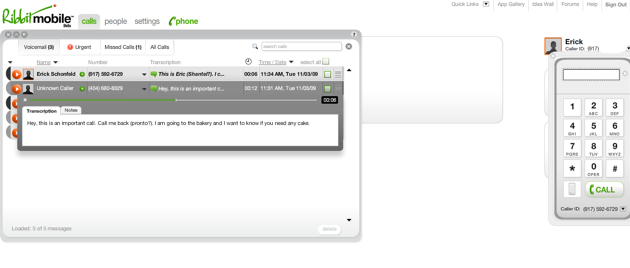
First, there was Google Voice. And all was good, and not so good. But it showed that there is a better way to manage voicemails than to listen to 15 in a row just to get to the one you care about.
Now, there is an alternative to Google Voice called Ribbit Mobile. And it too is very good. Ribbit Mobile is in private beta, but the first 500 people to sign up with the invite code “techcrunch” will jump to the front of the line.
Ribbit Mobile starts out by taking over your cell phone’s voicemail. You give it permission to do this by entering some codes it presents to you during the sign-up process. So Ribbit Mobile lets you use your existing number, something Google Voice also recently added as an option. Once you set up your voicemail, and record a new greeting message, you can get started.
All voicemails will now get routed to Ribbit Mobile and stored there. Every time you get a voicemail, it appears in your Ribbit inbox, where it can be played on your computer. It is also transcribed (using Phonetag/Simulscribe’s speech-to-text engine). And it is pretty accurate. It was even able to understand and transcribe a message left by my three-year-old son. Every transcribed voicemail also gets sent to you as an email.
So there is really no need to listen to a voicemail again. But you can retrieve them the normal way, by calling an assigned number you can save to your phone. The one drawback I found is that I no longer see the notification on my phone showing how many voicemails I have.
Ribbit also lets you route calls to any number, including Skype and Ribbit’s own Java phone which rings in your browser so you can take calls on your computer. It does not yet, however, let you assign different actions to different callers (put my wife through to my cell, put anyone not in my contacts through to voicemail).
When you are online, you can also sign into various social networks (Facebook, Twitter, LinkedIn, Flickr) and see recent Tweets, status messages, and photos from the person who is calling. It’s very Xobni-like in that way.
Soon there will be an iPhone app, and the ability to send “shouts” to Ribbit Mobile members. A shout is a voicemail that doesn’t actually ring the person’s phone, it just goes straight to voicemail, where it is then transcribed and sent along as a regular text message. Why talk, when you can shout?
Ribbit Mobile will launch with a free basic package, and then start charging between $10 and $30 a month for more services, such as human transcription. Ribbit was acquired by British Telecom last year for $105 million, so it’s not going anywhere.
One day, we’ll get a service like Ribbit Mobile or Google Voice that actually is built into our phones.
